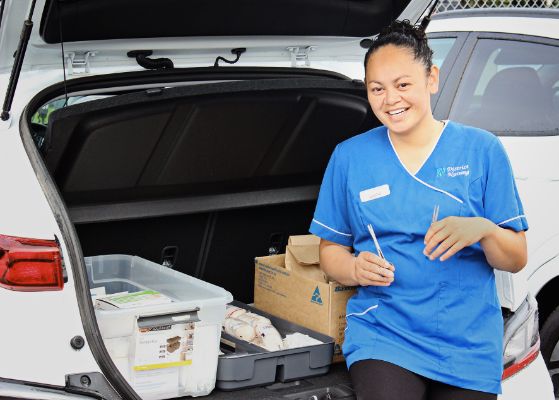Recycling Embraced At Te Whatu Ora Te Tai Tokerau

Te Whatu Ora Te Tai Tokerau staff have embraced recycling – everything from scissors to syringes.
The recycling certainly extends beyond plastics, glass bottles and jars, tins and cans, paper and cardboard.
Initiatives include sending PVC intravenous (IV) fluids bags, oxygen masks and tubes to a processing and manufacturing plant where they are chipped up and remoulded into safety matting for children’s playgrounds, workplaces and gyms.
Plastic syringes used in the surgical theatres at Whāngarei Hospital are collected and sent to a company that recycles them into plastic fence posts.
Single-use air transfer mattresses used for inpatient repositioning, as well as deep vein thrombosis compression sleeves and footpads are sent to a medical devices remanufacturer for cleaning and reprocessing. Te Whatu Ora Te Tai Tokerau then purchases back the reprocessed items, at a lower cost.
Waste Minimisation and Circular Economy Coordinator Jules Smith said that in the first 10 months, 416 air transfer mats were reprocessed and purchased back; avoiding 770kg of waste to landfill and resulting in $40,460 in financial savings.
Jules says this is an example of circular economy – the “beautiful circle” of using, recycling, repurposing and then re-using.
Another initiative is recycling single-use scissors, tweezers and forceps, which are disposable products made of low-quality metal and not designed to be re-used in healthcare.
The scissors, tweezers and forceps are put through an autoclave machine which uses high temperatures and pressures to kill microorganisms and sterilise them, making it safe and hygienic for handling by the metal recyclers.
Battery recycling is another initiative popular with staff, which Jules says is encouraging as anything to prevent batteries ending up in the landfill is a good thing, not only for the fire risk they pose.
“Batteries have a variety of recyclable materials such as steel, nickel, manganese dioxide, zinc, mercury, lithium, silver oxide and cadmium. However, they can also contain flammable or toxic substances. So, recycling batteries is not only an environmental safeguard, but also a health and safety precaution.”
Old towels no longer suitable for patient use are used as rags by the engineers at Te Whatu Ora’s hospitals in Whāngarei, Dargaville, Kawakawa and Kaitaia.
Jules says Whāngarei Hospital’s laundry has very little waste which is unusual. “Normally all linens sent to landfill, but here they are recycled. For example, worn or torn bed sheets are either sold to a rag manufacturer or, if suitable, cut and resewn into bassinet sheets.”
Medical equipment & clinical consumables that are no longer needed are given to social enterprise Take My Hands to rehome to hospitals in the Pacific Islands.
Other items recycled include e-waste, plastic shrink wrap, fluorescent lighting tubes, printer toner cartridges and shredded confidential papers.
Cool tubs and ice bricks are returned to the supplier to reuse, while biodegradable drug trays are given to the SPCA for use with animals in isolation to reduce cross contamination.
In addition, all food waste generated while preparing patient meals is collected by an MPI-approved pig farmer.
Jules says that while recycling helps reduce waste to landfill, minimising waste is even better than recycling it – “so we should strive for no waste in the first place”.
“We’re always looking at what other product stewardship programmes, recycling and waste minimisation opportunities are around, or where we can expand what we’re already doing. So, if anyone has any suggestions, please let us know.”


 Gordon Campbell: On The Government’s Epic Fails In Jobs And Housing
Gordon Campbell: On The Government’s Epic Fails In Jobs And Housing Kāinga Ora: Kāinga Ora Refocusing On Its Core Mission
Kāinga Ora: Kāinga Ora Refocusing On Its Core Mission New Zealand Labour Party: Still No Commitment To Build More Public Houses
New Zealand Labour Party: Still No Commitment To Build More Public Houses Crown Response to the Abuse in Care Inquiry: New Website In Response To Royal Commission Call For Records Support
Crown Response to the Abuse in Care Inquiry: New Website In Response To Royal Commission Call For Records Support New Zealand Government: Online Portal For COVID-19 Inquiry Opens
New Zealand Government: Online Portal For COVID-19 Inquiry Opens Aotearoa Workers Solidarity Movement: Jacinda Ardern - The Myth of Kindness and the Reality of Division
Aotearoa Workers Solidarity Movement: Jacinda Ardern - The Myth of Kindness and the Reality of Division New Zealand Government: Pukekohe Rail Electrification Completed
New Zealand Government: Pukekohe Rail Electrification Completed


